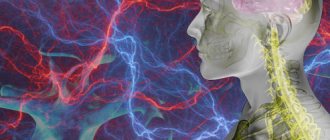Greenfield Set of exquisite tea and tea drinks in bags, 30 types, 120 pcs.
389 ₽ More details
Tea drink in bags Greenfield Floral Cloud, 25 pcs.
76 ₽ More details
Modern science fiction
Fainting is considered a short-term loss of consciousness. The main determining factor is metabolic disorders. A short-term one-time fainting during menstruation is not dangerous. Fainting during the menstrual period is rare. A woman is alarmed by the occurrence of this symptom on menstrual days. If symptoms recur regularly, a medical examination of the woman is required.
Sometimes girls may faint during their periods.
Types of fainting and their features
Fainting or syncope is a short-term loss of consciousness associated with oxygen deprivation of the brain. Classified as a mild form of vascular insufficiency. Types of unconsciousness:
- vasovagal (the most famous type, associated with physical or psychological stress, caused, for example, by a hot shower or the sight of blood);
- emotiogenic (provoked by excessive emotions, such as fear or excitement);
- hypoglycemic (with a sharp drop in blood sugar levels);
- cardiogenic (occurs when there is a disturbance in the rhythm or functioning of the heart);
- intoxication (appears when poisoned by a harmful substance);
- anemic (when the natural flow of blood is disrupted).
Drug-induced syncope, a side effect of some medications, also occurs. Fainting before menstruation is more often associated with cardiogenic causes or a sharp decrease in blood pressure.
Providing first aid for syncope
Before contacting doctors, the necessary treatment should be carried out, and first, bring the victim to consciousness. The person who is close to the patient must know what to do during a crisis.
If a woman faints, first aid should include a whole range of measures:
- To prevent possible injuries, you especially need to protect your head.
- Place the victim on a soft, flat surface, try to raise her legs above the level of her head.
- Free the patient from tight, tight clothing.
- The woman must be placed on her side to prevent breathing problems.
- Open the windows to provide oxygen flow.
- On critical days, you should not apply a hot heating pad to your stomach, as it can cause bleeding.
- Call the SPM team, especially if the patient is unconscious for more than 5 minutes, and the attack is accompanied by incontinence and convulsions.
Treatment for syncope depends on the cause. If a disease contributes to a pathological condition, then the main goal of therapy is to eliminate this disease.
If a woman faints, she should be given first aid
To treat fainting conditions, medications are most often prescribed that improve the supply of the brain with necessary oxygen and nutrients. Adaptogens allow a person to quickly get used to weather conditions. In case of a hungry attack of syncope, proper nutrition should be restored and diets should be eliminated.
If the victim has lost consciousness during menstrual bleeding, you need to take medications to alleviate the pathological process. When a victim faints as a result of urinary incontinence during sleep, she should avoid drinking fluids at night.
How to identify presyncope
Signs of imminent syncope:
- sudden dizziness;
- darkening or “silver veil” in the eyes;
- manifestation of nausea;
- numbness, tingling sensation in the arms and legs;
- weakness in the legs;
- feeling of “coldness” inside;
- the appearance of cold sweat;
- pale facial skin.
It is important to notice the approach of fainting in time to have time to sit or lie down. This will help protect you from falling and hitting your head.
Preventing syncope attacks
After a crisis, the victim needs complete rest for several hours. If there was a fall during fainting that led to injury, then the patient should be taken to the hospital for medical care and diagnosis.
To prevent syncope during menstrual bleeding, a woman should:
- Eat nutritiously and properly.
- Use multivitamin complexes that compensate for the lack of microelements and vitamins.
- Drink enough fluids to prevent dehydration.
- Avoid overwork and stress.
- During menstruation, try not to drink “fun” cocktails and give up tobacco products.
Crises during menstrual periods can occur against the background of severe pain that appears as a result of spasm of the muscle tissue of the uterus. Sometimes fainting is caused by various processes (dehydration, blood loss) or pathologies (diabetes, anemia).
During an attack, a woman needs first aid; in some cases, a consultation with a doctor is required to determine the cause of syncope. If the provoking factor is illness, competent treatment will be required to prevent fainting.
Adequate and proper nutrition is the key to reducing attacks of syncope
Causes of fainting in women
Teenagers and adult women may experience fainting during their period. Reasons characteristic of such syncope:
- decreased blood volume;
- blood pressure decreases sharply;
- increased level of carbon dioxide in the blood (due to stuffiness in the room);
- decreased hemoglobin level.
The attack can cause severe pain during menstruation to the point of fainting. Infrequently, the cause is sudden fear. Fainting during menstruation from abdominal pain often occurs with severe PMS.
Symptoms of premenstrual syndrome
The symptoms of premenstrual syndrome vary widely from person to person; Each woman may experience this condition differently. There are about 150 possible symptoms of PMS. They are divided into two groups: physical, emotional, the latter group also includes behavioral symptoms.
Premenstrual dysphoric disorder (PMDD) is particularly recognized as the most severe form of PMS. PMDD is characterized by more severe symptoms, primarily from the group of emotional and behavioral ones.
Physical symptoms
The most common physical symptoms are:
- feeling of fullness and bloating. You may feel a buildup of gas. Fluid retention is also possible;
- soreness of the mammary glands;
- intestinal disorder manifested by constipation or diarrhea;
- fatigue and increased fatigue;
- dizziness, nausea or vomiting;
- headache and back pain. There may also be muscle and joint pain. PMS can make migraines or asthma worse;
- increased sensitivity to noise and bright light;
- rapid heartbeat and increased sweating;
- skin symptoms such as acne or oily skin;
- discomfort in the pelvis and even pain.
Emotional and behavioral symptoms
First of all, the following emotional and behavioral symptoms are distinguished:
- atypical cravings for sweets;
- feelings of hopelessness and sadness;
- excessive tension, anxiety and nervousness;
- mood swings: bouts of tearfulness and outbursts of anger;
- loss or, conversely, increased sexual desire;
- self-esteem problems and feelings of guilt; some women may suffer from irrational and reinforced fears;
- sleep disturbances, which may manifest as difficulty falling asleep, interrupted sleep, or excessive sleepiness;
- slowness and lethargy of movements.
Specifics of the pathology
Fainting during menstruation is the body not having time to adapt to the loss of blood. The answer to the question “why do people faint during menstruation” is usually connected with this. This problem often occurs at the very beginning. Because of this, complaints appear: “I faint on the first day of my period.”
Indirect reasons:
- constant stress;
- strenuous physical activity.
Such syncope occurs only during menstruation and does not bother at other times.
Why you shouldn’t hesitate when dealing with syncope
Fainting can occur for various reasons. Depending on the factors that provoked the attack, its course also depends. But in any situation, the pathological condition leads to a short-term disruption of blood flow and blood supply to the brain, causing oxygen starvation.
Fainting should not be taken as a normal condition, especially if it occurs systematically. You should definitely consult a gynecologist, neurologist, or cardiologist.
Do I need to see a doctor if I experience regular fainting?
If such a symptom occurs for the first time, you must consult a doctor. You need the advice of a gynecologist, and, if necessary, other specialists. Diagnostic methods:
- collecting anamnesis (data about menstruation, its regularity, duration and frequency of fainting);
- examination (pressure measurement, auscultation and percussion of the heart and lungs);
- comprehensive examination (general analysis and blood glucose, ECG).
If it is necessary to exclude the risk of disease, additional studies are prescribed.
Drugs
Drug treatment used:
- non-steroidal anti-inflammatory drugs (Paracetamol, Ibuprofen) – for painful periods;
- antispasmodics (“No-shpa”);
- vitamin E;
- sedatives (herbal medicines or tranquilizers).
For complex pathologies, combined estrogen-gestagen agents are used.
Danger signs and risks of complications
If the complaint “I faint during menstruation” is repeated frequently, this is a reason to visit a gynecologist. Regular syncope may be a sign of:
- inflammatory process in the pelvic organs;
- arterial hypotension;
- decreased or increased blood sugar;
- heart problems.
Medical attention is needed urgently if cramps of the calf muscles or the whole body appear simultaneously.
Alternative treatment for syncope
You can also fight fainting with the help of traditional medicine recipes. Simple reflex remedies will help the victim quickly regain consciousness. As an additional treatment, the doctor may recommend restorative therapy, which involves the use of herbal ingredients. Often it allows you to eliminate the cause and symptoms of the pathology.
Treatment of syncope attacks involves the use of the following:
- Chicory.
- Juniper.
- Forest birch.
- Eleutherococcus.
- Ginseng.
- Garden nettle.
- Schisandra (tinctures).
- Peppermint.
Herbs are recommended for use in preparing herbal infusions. Gentian is very effective for fainting. To make a therapeutic and prophylactic remedy that helps with fainting, you will need:
- grass – 2 teaspoons;
- boiling water – 200 ml;
- combine the ingredients together;
- leave for 30 minutes, filter;
- use the remedy 30 minutes before meals, 100 ml 3 times a day.
After an attack, the victim should be given freshly brewed strong black leaf tea or chamomile decoction. In the absence of problems with the heart muscle, a woman can drink coffee without sugar or cognac. This will restore blood circulation.
The use of Eleutherococcus will help relieve attacks of syncope
Burdock will help improve your condition after an attack of syncope. It needs to be kneaded well and placed in the solar plexus area. If fainting was observed as a result of dysfunction of the central nervous system, the woman will be helped by sedative herbs - St. John's wort, lemon balm, linden.
If the victim is unconscious, you can bring her to her senses using a cooled wax ointment. Preparing the medicine is quite simple: combine rose and violet oils with milk and vinegar in equal proportions. Apply the prepared mixture to the parietal area.









